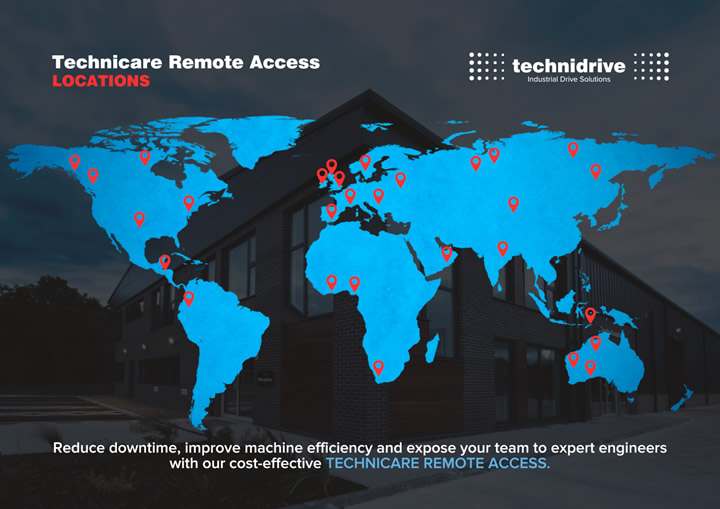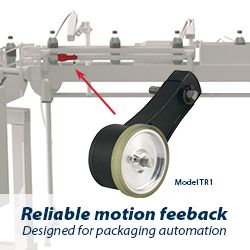In 2024, manufacturers must overcome a number of hurdles if they are to implement an effective predictive maintenance strategy. Indeed, Deloitte cites several challenges: "Economic upheaval, a tight labour market, rising costs and continued supply chain stresses."
 Support whenever it's needed - Remote support proves vital to efficient and competitive milling operations
Support whenever it's needed - Remote support proves vital to efficient and competitive milling operations

Gary Kernaghan, Automation Manager | Technidrive
70 per cent of manufacturers surveyed by Deloitte say they have integrated advanced technologies, like data analytics and cloud computing, into their manufacturing processes. But, as manufacturers increasingly embrace digitalisation, competition is sure to intensify — and the vital role of predictive maintenance mustn’t be overlooked. Here, Gary Kernaghan, automation manager at Technidrive, the specialist supplier of industrial drives, electrical motors and gear units explains why remote maintenance is vital if manufacturers are to stay competitive.

Deloitte's survey found that nearly half of manufacturers are already using IoT sensors, devices and digitalised systems. Industry 4.0 will continue to revolutionise all areas of manufacturing — including the global feed grain market, which is poised to grow from $50.0 billion in 2024 to $70.0 billion by 2034, according to Future Market Insights. The growth will be driven by factors such as the expanding livestock industry, the surge in population and rising demand for high-quality animal feeds.
With the continued rise of Industry 4.0, we can expect to see digitalisation and AI algorithms become the norm with industrial milling machinery in the coming years.
Another essential factor in optimal machine performance is predictive maintenance, crucial in preventing unscheduled downtime and breakdowns. Predictive maintenance has been gaining traction for a few years now. 98 per cent of manufacturers surveyed in Pricewaterhouse Coopers (PwC)’s Digital Factories 2020 report said they expected predictive maintenance would increase their manufacturing efficiency.
Nevertheless, in 2024, manufacturers must overcome a number of hurdles if they are to implement an effective predictive maintenance strategy. Indeed, Deloitte cites several challenges: “Economic upheaval, a tight labour market, rising costs and continued supply chain stresses.” These factors, says the report, “underline the importance of agility, resilience, and efficiency in manufacturing operations.”
Traditional approaches to maintenance are increasingly at odds with these challenges. For instance, a maintenance engineer might drive five hours to perform a 15-minute adjustment on a piece of equipment. Or skilled engineers may be needed onsite continually for ongoing repairs and diagnostics. Manufacturers can ill afford such inefficiencies, time and costs, or labour shortages, in today’s competitive markets.
So what can be done? Deloitte recommends that “technology is poised to play a significant role” — but that is only half of the story. What if advanced technologies like data analytics and cloud computing can also open up manufacturers to an entire world of skilled, expert support? Specifically, remote maintenance.
Remote access
Remote maintenance will be vital to more efficient milling operations. First, let’s consider the more familiar concept of remote IT support for office environments. The service provider uses online tools and software to connect to a client's computer or network, and solve issues from a distant location. This concept can also be applied to milling machinery.
Connecting to an office worker’s Mac or Windows PC is one thing, but how does remote maintenance work in more complex industrial manufacturing environments? A simple approach is demonstrated by Technidrive, whereby preloaded tablet devices are supplied to the customer. The tablet is equipped with remote access software, specifically TeamViewer, allowing seamless and cybersecure communication between the customer’s in-house operators and Technidrive’s experienced maintenance team, as part of its Technicare remote support offering.
Technidrive's remote support offering is particularly advantageous for feed milling applications because it allows for quick diagnostics and troubleshooting, without the need for costly and time-consuming on-site visits. Take the example of a variable speed drive (VSD) that controls the speed of motors powering various machinery like conveyors and crushers. If a VSD malfunctions, it can halt the entire milling process, leading to significant downtime and loss of production.
Technidrive collaborates with leading manufacturers like WEG to integrate advanced technologies into milling equipment including PLCs, HMIs and soft starters and also WEG’s CFW700 variable speed drive (VSD). The VSD has built-in USB connectivity, which makes it easy for maintenance engineers to connect to the device remotely through a tablet. USB capabilities can be retrofitted into existing hardware or control systems. With remote support capabilities, Technidrive can provide immediate assistance.
Through remote access, Technidrive engineers can analyse real-time data from the VSD. If the VSD displays abnormal behaviour such as overheating or erratic speed control, mill operators can initiate a remote diagnostic session. Technidrive can rapidly identify the root cause of the issue, and guide operators through troubleshooting steps or adjust parameters remotely to restore normal operation.
In the cloud
Over the coming years, cloud computing and the IoT will further enhance manufacturers’ predictive maintenance strategies. Cloud-based platforms allow for real-time data collection and analysis, enabling machine shop owners and operators to monitor and optimise operations remotely. IoT sensors can be integrated into machinery and equipment to provide real-time data on performance and maintenance needs, and support swift resolutions to problems.
Data combined with the cloud could offer a wealth of remote maintenance possibilities. Perhaps satellite-based internet services like Starlink could support advanced remote maintenance in isolated locations? For now, remote support is emerging as a vital tool, facilitating seamless communication with milling equipment and ensuring operational excellence in the evolving Industry 4.0 landscape.
To learn more about Technidrive’s remote support for milling operations, visit its website.
The content & opinions in this article are the author’s and do not necessarily represent the views of ManufacturingTomorrow
Featured Product

